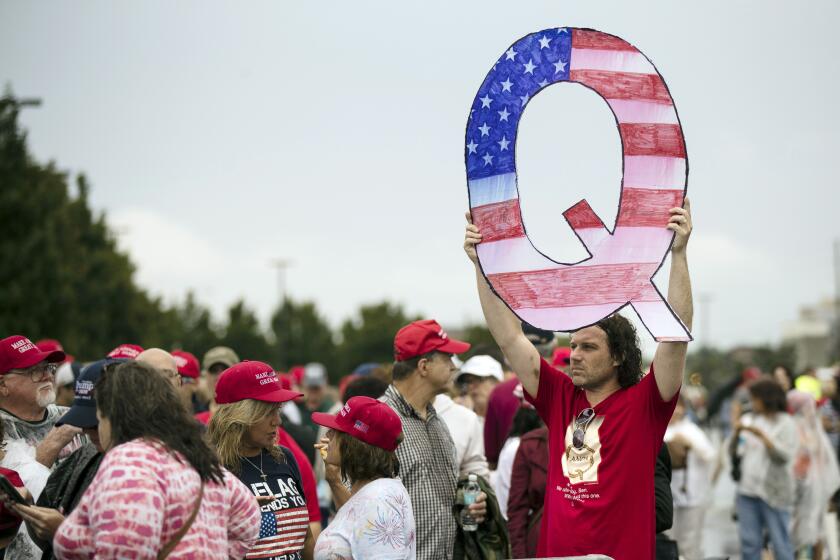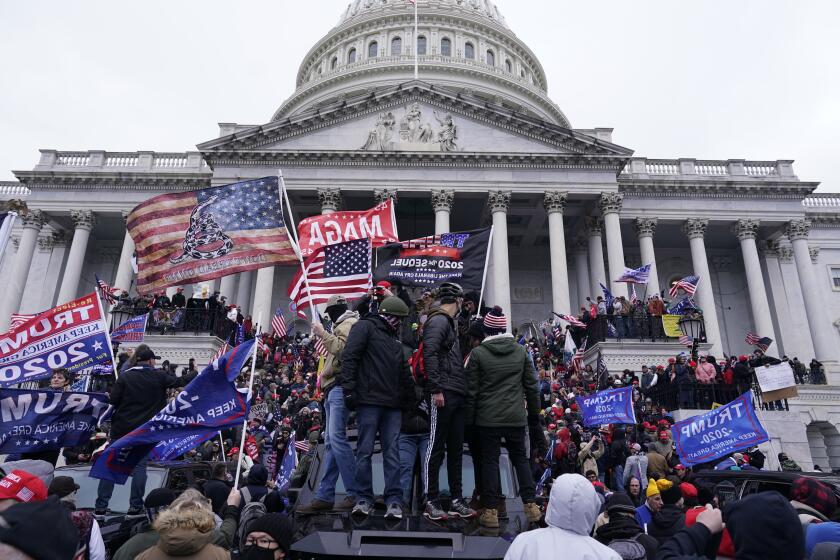QAnon and other conspiracy theories are taking hold in churches. Pastors are fighting back
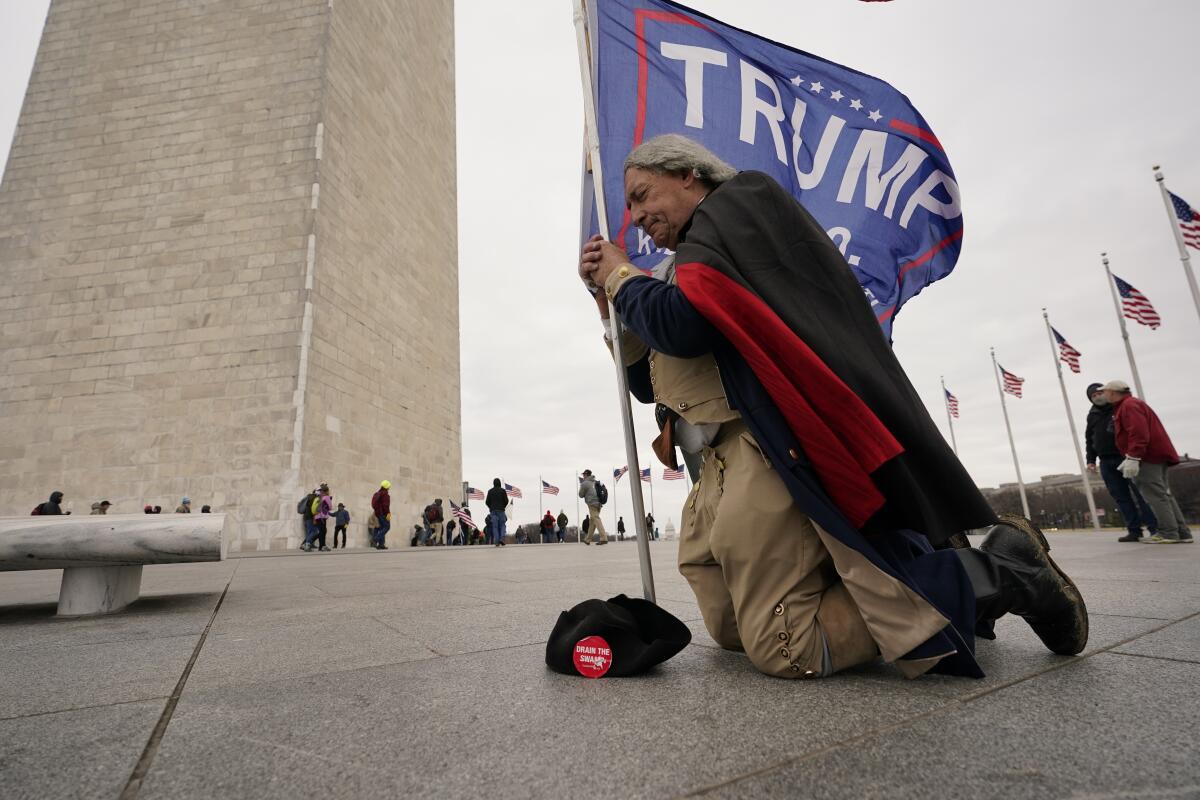
- Share via
The congregation was in the middle of an online service when a longtime churchgoer in her 60s texted her pastor to complain that his prayer lamenting the assault on the U.S. Capitol in January was “too political.”
The woman later unloaded a barrage of conspiracy theories. The election of Joe Biden was a fraud. The insurrection was instigated by Black Lives Matter and antifa activists disguised as Donald Trump supporters. The FBI was in on it all. The day would soon come, she said, “when all the evil, the corruption would come to light and the truth would be revealed.”
Startled and moved to tears, Pastor David Rice told the woman she had been “tricked by lies.”
“You need to know how crazy this is,” he said to his congregant at Markey Church in Roscommon County, Mich., a rural region of about 25,000 residents that voted 2 to 1 for Trump. “You have been with my family and in my home and I care for you, but you are dabbling in darkness. You are telling me it’s giving you hope. I’m telling you as your pastor that it’s evil.”
The two haven’t spoken since.
Details emerging from investigations into hundreds of Capitol rioters have cast an unsettling light on the toxic roles that fringe religious beliefs and QAnon conspiracy theories are playing in shaking big and small churches across the nation. Trump’s false insistence that he won the 2020 election may have incited the mob, but it also pointed to a dangerous intersection of God and politics.
QAnon is the baseless conspiracy theory that President Trump is battling a powerful group of elites who, among other crimes, run a child sex ring.
A Kentucky man whom the FBI charged as the first to enter the Capitol through a broken window saw himself as fighting a holy war on behalf of his president and, in a booking photo, wore a T-shirt that quoted Ephesians 6:11: “Put on the full armor of God, so that you can take your stand against the devil’s schemes.”
Jacob Chansley, the shirtless man dubbed the “QAnon Shaman” for his distinctive fur hat, horns and American flag face paint, said a prayer from the vice president’s U.S. Senate dais, thanking the “heavenly Father” for “allowing us to get rid of the communists, the globalists and the traitors within our government.”
In photos from the Capitol on Jan. 6, religion abounds: “Jesus 2020” and “Proud American Christian” banners, a flag with an ichthys, or “Jesus fish,” and a man in a jacket advertising the Knights of Columbus Catholic fraternity among them.
For pastors like Rice, whose church members were hundreds of miles away from Washington, D.C., and by and large abhorred the attacks, the lawlessness that day has spurred them to speak out against the rising tide of misinformation and Christian nationalism that they, too, have seen gripping their congregations and evangelical life in the United States.
“Something disturbing has happened with evangelicals in this country, where we have become prone to conspiracies and believing the worst about our enemies, where we end up placing the Republican Party and ourselves as Americans first before true Christianity,” said Rice, 39, who has led his Baptist church for six years and doesn’t identify with either major party.
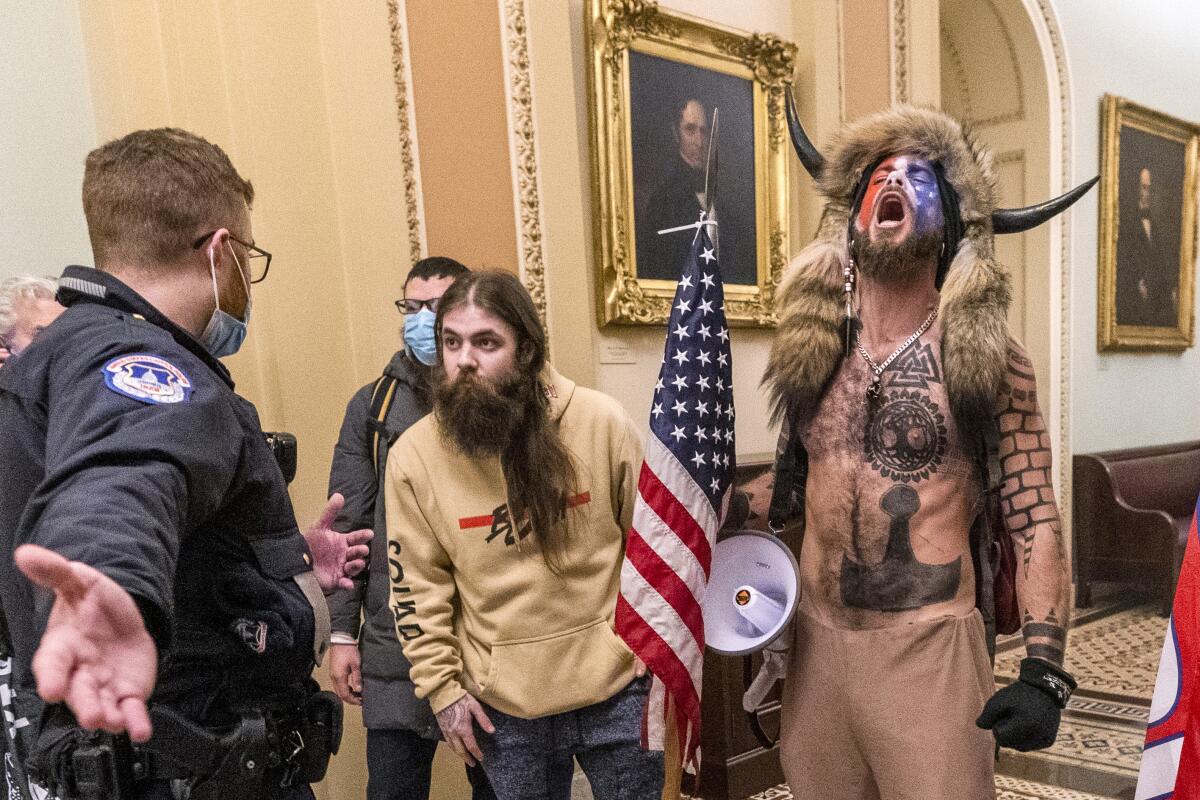
His fears are matched by recent data.
The American Enterprise Institute, a conservative think tank, reported in February that more than a quarter of white evangelicals believe the QAnon conspiracy theory, which holds that a cabal of powerful politicians run a global child sex trafficking ring, is “mostly” or “completely” accurate. The rate was the highest of any religious group. The same survey indicated that 3 in 5 white evangelicals believe Biden’s win was “not legitimate.”
A poll released this year from Nashville-based Lifeway Research, an arm of the Southern Baptist Convention, indicated that 49% of Protestant pastors often hear congregants repeating conspiracies about national events.
The trends led a group of more than 500 influential evangelical pastors, thinkers and faith leaders to publish an open letter recently condemning “radicalized Christian nationalism” and the “rise of violent acts by radicalized extremists using the name of Christ.” Signers of the letter, titled, “Say No to Christian Nationalism,” included the late Rev. Billy Graham’s granddaughter Jerushah Duford, and the Rev. Jim Wallis, founder of Sojourners, a prominent progressive Christian advocacy organization.
The spread of disinformation isn’t exclusive to religious groups and is widely seen as a larger scourge of the internet. In the last year, Facebook and Twitter have cracked down on QAnon-related accounts and appended fact checks to posts on COVID-19 and the presidential election. Conservatives and some free-speech supporters have said the social media companies went too far when they canceled Trump’s accounts for their role in the insurrection.
Why so many military veterans and former and current police officers support — and take part in — far-right groups and protests, including the Jan. 6 Capitol riot.
Yet, because Christianity is the largest faith in the U.S., “it’s key to look at churches and pastors as spaces where people organize and spread their ideas,” said Andrew Whitehead, an Indiana University-Purdue University sociologist and coauthor of “Taking America Back for God.”
Whitehead studies the growth of Christian nationalism, which he described as “the fusing of Christianity with the belief that we are a Christian nation, one that God has chosen specifically for success and a particular Christian path, one that has been tied to the Republican Party and being white.”
This joining of politics and faith “has been influential for decades but was given a much bigger megaphone by Trump,” he said. “We’ve seen that those who embrace Christian nationalism are also more likely to believe in conspiracies.”
In interviews, pastors said houses of worship were particularly susceptible. But this new brand of identity politics has tested the power of the preacher against extremist voices in the pews. A Sunday morning can veer from the poetry of the Sermon on the Mount to the latest screed on Telegram.
“Fringe ideas can spread very quickly,” said Mark Fugitt, pastor of Round Grove Baptist Church in Miller, Mo., who said he’s battled them in his rural congregation of 300.
He recalled going on Facebook a few months ago and making a list of the radical, false ideas church members had shared: face masks cause carbon dioxide poisoning, germ theory is fake, 5G networks are part of a ploy for mind control, and a child sex trafficking ring with connections to Hillary Clinton and her allies was being run out of a Washington pizza shop.
Fugitt, who plans his sermons months ahead of time, said he tries to incorporate Christian messages that apply to the modern-day plague of conspiracies as well as everyday life.
“I don’t look at the news and then write my sermon, but I look at Scripture and highlight biblical virtues like not lying and loving your neighbor,” said Fugitt, 35. The Sunday after the Capitol attacks, he spoke in church about the parable of the good Samaritan from Luke 10:25-37. The next Sunday, the topics included the parable of the prodigal son.
Still, he’s sometimes at a loss. After seeing a recent Facebook post by a pastor who said rolling blackouts in Texas were the federal government “trying to condition us for communist control,” Fugitt didn’t reply privately or comment publicly because he was unsure he could change any minds.
For some pastors, church climates in the last year have become too much to bear.
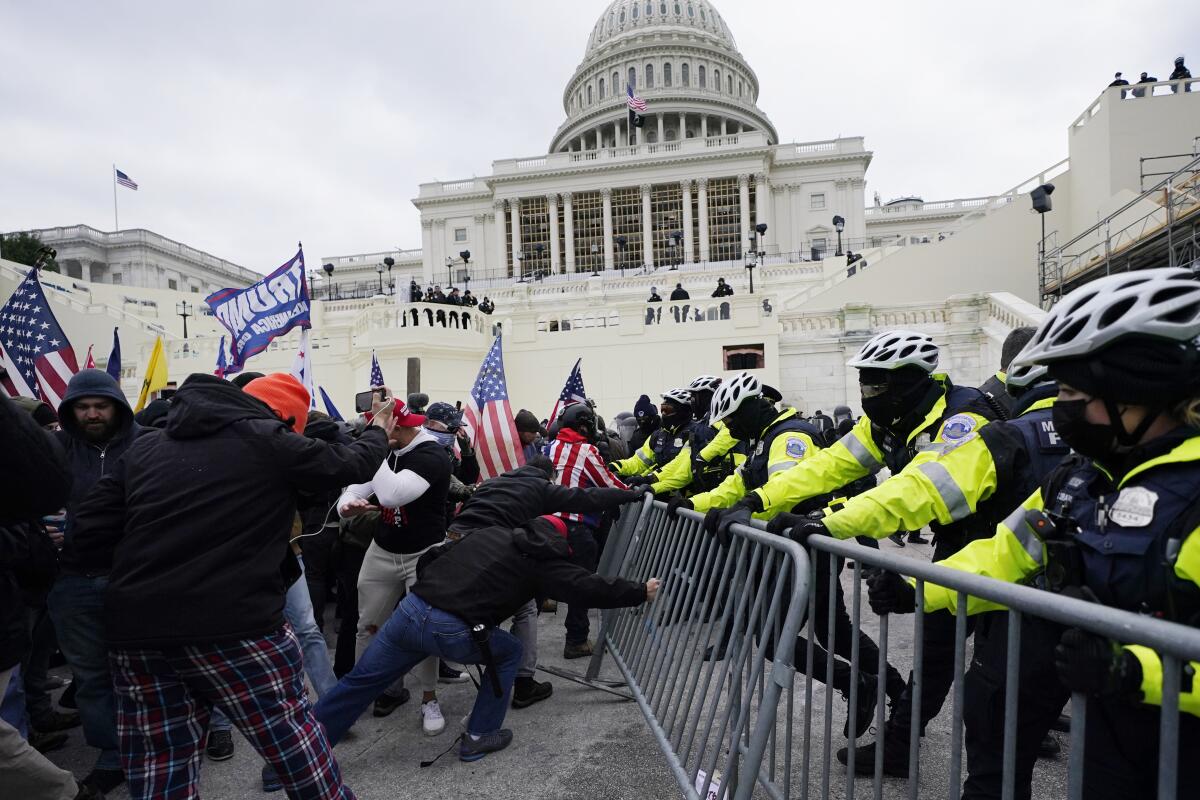
Vern Swieringa, a Christian Reformed Church pastor, agreed to leave his post in the small western Michigan village of Hamilton in December after months of disputes with his congregation over his request to require masks.
“That was the biggest part of it, but there was so much more,” said Swieringa, 61. “There were elderly members of my congregation that would share videos with me saying that Democrats were going to turn this country to socialism, that they were evil and QAnon was right. I tried to say with love that these were conspiracies and they would thank me, but I’m not sure if it worked.”
Swieringa recently got a new part-time job as a pastor at Kibbie Christian Reformed Church in South Haven, Mich., where masks are mandatory.
Jared Stacy, a Southern Baptist pastor, had a similar experience.
Over his four years as minister in Virginia, Stacy noticed a gradual uptick in conspiratorial conversations beginning to divide his congregation, which was split between young professionals and retirees. After George Floyd died at the hands of police in Minneapolis last summer, he said, the problem got worse.
“Older members would ignore Black Lives Matter and instead say we had to focus on sex trafficking,” he said. Stacy, 30, tried to tell congregants that both issues — racial justice and sex abuse — needed their prayers and attention. But he noticed that the concerns about sex trafficking were more specific to a QAnon belief in “Democrat pedophilia.”
“It’s like 2020 just exposed so many undercurrents that were already there and growing,” Stacy said. “How could I compete, with an hour of a sermon on Sunday, with a person who was committing hours and hours to media and information on YouTube and Facebook?”
Stacy left the church in November. Today, he lives in Scotland, where he studies theology at the University of Aberdeen, and hopes to one day return to the U.S., possibly again as a pastor.
“The year 2020 drove my family to take a distance from America,” he said. “Christianity is global. Evangelical Christianity is global. When you look at the U.S. Christianity from the outside, you wonder what happened.”
More to Read
Sign up for Essential California
The most important California stories and recommendations in your inbox every morning.
You may occasionally receive promotional content from the Los Angeles Times.

